Persian is cool. Trust me.I’m a native Persian speaker living in Iran. Feel free to ask me anything about the Persian language and culture. (Not the politics tho, cuz it’s a hideous mess I don’t wish to get into on this blog)
Don't wanna be here? Send us removal request.
Note
Hello
I wanted to ask if i say
تو خوبي
Is it like I’m asking a guy or a girl , or can i use it for both?
Thankyou ☺️
Hello!
Farsi is a gender-free language so you can use it for any gender. Just take care that we differentiate between a formal and friendly “you”.
12 notes
·
View notes
Text
It’s our New Year. We call it Norouz, a 3000-year-old tradition with its roots in Zoroastrianism and it’s celebrated by many people around the world. We set the Haftseen, seven things starting with S, each symbolizing health, wealth, hope, life, happiness. We gather around our loved ones and hope for better days to come. This time, I kept thinking about all the innocent, beautiful people we lost. That the Islamic regime took away from their families. Everyone who’s in prison because they wanted to live a normal life; because they wanted to have basic human rights. All the schoolgirls who took off their oppressive hijab and stood up against the mullahs and became the target of the regime’s revenge. Everyone who experienced the worst kind of trauma, fear, anxiety, helplessness. This year was the worst year for us in Iran. But it also had a moment of beauty. When the world saw our suffering and shared our voice and made us feel we’re not alone. Thank you for being with us through this nightmare. This seemingly everlasting nightmare. But it will end, as everything must. I can only hope that it’ll be a happy ending. And that it’ll come before more innocent lives are lost.
84 notes
·
View notes
Text
مهر
We have a word in Farsi, "مهر" (pronounced: mehr) that roughly translates to kindness. I was reflecting on this word today and wanted to expand on its relevance.
One of the phrases which uses the word is "مهرت به دلش بشینه" This phrase is directly translated to "May your love sit in their heart," and is a prayer or wish made for lovers or friends. We pray that your beloved loves you/ has kindness in their heart for you.
It's interesting, because when we love someone, we associate even their most negative traits with something positive. We choose to see the best in that person because we have a special sense of kindness in our hearts for them.
The مهر can turn someone's most viscous qualities into things we are willing to look past or even admire. In other cases, lack of مهر can cause us to see someone's most beautiful and incredible traits as something ill intended or malicious.
I just love that there is a word for this concept/idea in Farsi.
243 notes
·
View notes
Note
I just came across your blog and found it super interesting. I found your terms of endearment post and I was wondering how Farsi and Arabic are related in the language family tree. Aziza, nafas and asal are terms which I've heard before. Thanks so much for this blog. I'm learning so much and you clearly put alot of work into it.
Hi! Thank you. Im glad you found this blog useful.
Well farsi and arabic are two different languages and belong to two separate language family. Arabic is in the Afro-Asiatic family and Farsi is in the Indo-European family. But we do share our alphabet (with a few different letters) and some common vocab, but our language structure and grammar is totally different. So a farsi speaker and an arab speaker won’t be able to understand each other. You could say the relationship bw farsi and arabic is like the relationship bw english and spanish or french. Almost similar alphabet and a lot of loan words, but two entirely different languages.
And yes, you’re right! aziz, nafas and asal are all loaned words from arabic. In persian, some loaned words are more commonly in use than their persian equivalent. For example, Asal (honey) in farsi is Angabin انگبین but you may only hear it in poetry and literary texts. Or Salam (hello) is more commonly used than Doroud درود, which again is more formal and poetic.
18 notes
·
View notes
Text
هر خوشی که فوت شد از تو مباش اندوهگین
کو به نقشی دیگر آید سوی تو میدان یقین
- مولانا، شاعر ایرانی قرن ۱۳
Don’t grieve. Anything you lose comes around in another form.
- Rumi, 13th Persian poet
“Har khoshi ke fot shod az to mabaash andouhgeen
Kou be naghshi digar aayad souye to midaan yagheen”
242 notes
·
View notes
Text
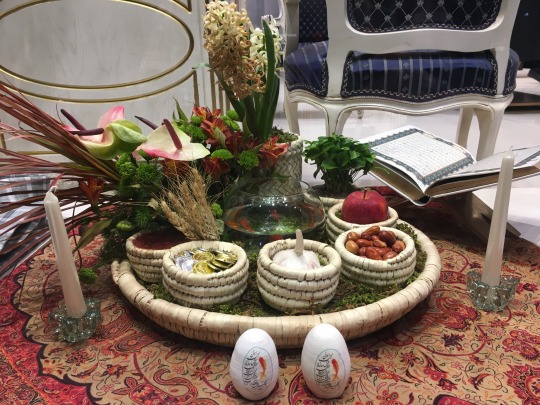
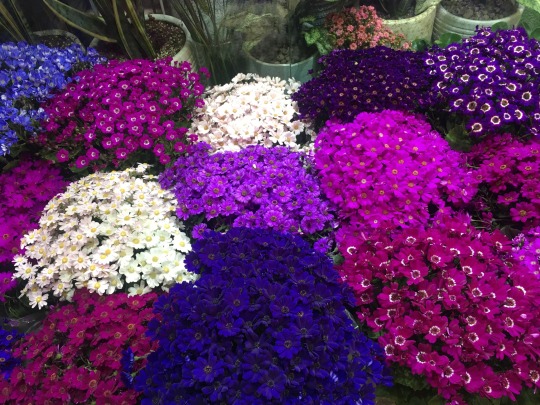
It’s the Persian New Year; 1401. The turn of the century. We call the new year “Norouz” نوروز, which literally means ‘new day’ and starts on the first day of Spring. And put seven certain things that begin with an S on a table and call it ‘Haftseen’هفتسین, which means ‘Seven S’s’. Things like Seeb (apple), Seer (garlic), Sekke (coin) but also other things that don’t start with an S like painted eggs, a mirror and candles. All have symbolic meanings, like heath, wealth and good fortune. Happy Norouz to everyone who celebrates it!
#norouz#persian new year#haftseen#eid e norouz#sal e no#1401#iran#Afghanistan#Tajikistan#uzbakistan#goergia#azerbaijan#and many more nations around the world celebrating norouz#hyacinths are the special flowers of norouz#almost eveey household has one for norouz
100 notes
·
View notes
Text
Is anyone here interested in learning about Rostam, the most iconic mythological hero in Persian folklore? Because he’s a favorite character of mine and I want to talk about him but it’s gonna take a lot of time so do you wanna hear it?
#its a loooong story#but hopefully a very interesting one#rostam#shahnameh#ferdowsi#persian folklore#iran
100 notes
·
View notes
Note
salaam ✨ man syarifa hastam 🙏 i'm so thankful for your informative blog regarding the enchanting farsi language 🥺❤️ i do read arabic quran (indonesia being my main language) but i understand that in farsi the sounds are different! i do have a small question about this pic:

the second line of this nizami ghavani's poem i found on google images; i have been trying to transliterate it in farsi but i really, really am so unsure. i haven't been able to figure out! (i kinda don't know if this pic is legit or not though, hehe)
is it tuu leyli shookih man majnuu nam id wast, or am i still incorrect phonetically? what would you think is the best romanization of the second sentence?
also, thank you so much for taking your time reading my question ♡♡♡
Hey there, Syarifa! Thank you for the kind words, i’m so glad you’ve found this blog useful!
You’re right, we might share a lot of letters with the Arabic language but the way we pronounce them is slightly different. For example, we don’t differentiate between “ز-ض-ظ-ذ” and pronounce them all the same as the ‘z’ in English.
The line in the picture is from a poem by Nezami Ganjavi. And it goes like this: “Hadis e aasheghi bar man rahaa kon/ to leili sho ke man majnoonam ei doost”
I think the reason you’ve been struggling with it is because the writing is not quite right. It should be “ای دوست”, because it’s two separate words. Hope that cleared things up!
25 notes
·
View notes
Text
Persian slangs with ‘donkey’
Khar خر means donkey in Persian and it’s used in some interesting slangs to mean ‘too much of something’. Here are some examples:
Kharpoul خرپول is made up of ‘khar’ خر meaning ‘donkey’ and ‘poul’ پول meaning ‘money’. It means ‘filthy rich’.
Kharshaans خرشانس is khar خر + shaans شانس (luck) and it means ‘lucky as hell’.
Kharkhoun خرخون is khar خر + khoun خون (reader) which means ‘bookworm, nerd’. Someone who spends all their time studying to get the perfect marks.
Kharkeif خرکیف is khar + keif کیف (joy) and means ‘overjoyed, over the moon’.
All of these terms are slang and may come across as slightly offensive/derogatory. If you call someone ‘kharkhoun’ you’re definitely not complimenting their studious nature.
But you can use kharkeif to refer to yourself if you’re overjoyed about something.
Just mind that these words shouldn’t be used in formal and polite settings or people would think you’re being rude and disrespectful.
You can use them freely with friends and family however.
* if you tell someone ‘kheili khari’ خیلی خری (you’re so donkey!) you’re calling them a dumbass. It could be really insulting or just a friendly jibe, depending on the tone and your relationship.
91 notes
·
View notes
Note
hey broski! in your post on Yalda you said “There’s dancing and drinking (if you’re into it. Some traditional families don’t drink)”. just curious, i thought the no-alcohol rule was really enforced. do most people get around that? what strict laws in iran actually get listened to?
Hey there! Oh you’d be surprised how many rules Iranians (or people in general, lol) are willing to break on a daily basis just to be able to live like a normal person.
Despite the law against the selling and buying of any alcoholic drinks, people have access to them if they know the right person. Since the drinks are really expensive, you can rest assured that almost all middle and upper class families have access to drinks and almost all extravagant parties serve alcoholic beverages of one kind or another.
Some people make their own wine. But other types of drinks are all contraband so extra care must be taken to make sure the drinks come from a safe source.
What strict laws actually get listened to? Well, some people will always abide by the laws because the punishment, if caught, is severe. But others will always try to find a way around it. Like the law on hijab or against homosexuality or abortion. (Or even accessing blocked websites; fun fact, tumblr is actually blocked in iran).
I think people are the same all over the world. The governments may differ in how lax or severe they are on the laws but the people are all the same more or less. We as humans don’t like it when our basic human rights are taken away. So we will try our damnedest to take them back, with all the risks and punishment that come with it.
32 notes
·
View notes
Text
تو در میان گلها چون گل میان خاری
“You among flowers are like a flower among thorns.”
Saadi, 13th century Persian poet
“To dar miaan e gol ha chon gol miaan e khaari”
#saadi is the master of perfect oneliners#if u ever wanna flirt in persian#read saadi#lol#farsi#persian language#persian poets#romantic poems#love poem#saadi#persian poems
592 notes
·
View notes
Text
🎉Happy Persian New Year!🎉
Today’s the Persian New Year, 1400. We call the New Year holidays ‘Norouz’ نوروز, which literally means ‘new day’, and lasts for 13 days.

Something interesting about this year is that 1399 was a leap year, so today March 20 before 13:07:28, it’s still 1399 but right after that it’s 1400. Although on the calendar the year officially begins on March 21.
I wish everyone who’s celebrating the New Year today a wonderful year ahead! 🌸🎉🌸
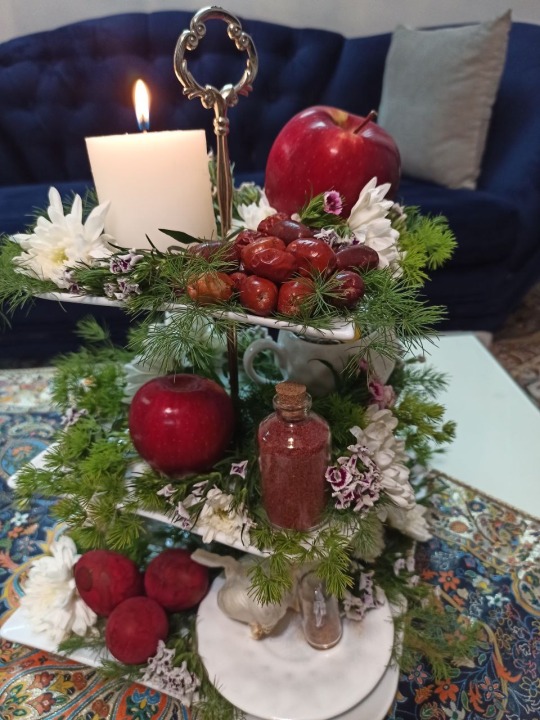
* The first picture I took yesterday of people doing some last-minute shopping before Norouz or just enjoying the fresh air (rare as it is) in Tehran.
* The second picture is the Haft-sin هفتسین (literary, Seven S’s) I decorated for this year. Haft-sin is the Persian equivalent for the Christmas tree (only cooler lol) and each seven items that begins with S has a symbolic meaning related to happiness, riches and health. Every household has a different way of decorating their haft-sin each year.
107 notes
·
View notes
Text
A freeloader in Persian is called a parachutist!
In Persian, if you call someone a chatrbaaz چترباز (parachutist), figurively you’re calling them a freeloader.
If you say someone has opened their parachute (chatr baaz karde چتر باز کرده), figuratively you mean they are freeloading.
In a more informal and also more common way, people would just say chatr shodan چتر شدن (to become a parachute) to mean that they’re gonna freeload. And would simply call freeloaders ‘chatr’ چتر (meaning a parachute).
Example:
A: mishe emruz ham baa maashin to berim? (Can we go with your car today, again?)
B: mikhaai baaz chatr shi? (You wanna be a freeloader again?)
70 notes
·
View notes
Text
Today I want to tell you about an interesting story from Ferdowsi’s Shahname (977-1010 CE). It’s a love story between Roudabeh رودابه and Zaal زال.
The interesting part in this story is the scene that seems to have inspired the German fairytale Rapunzel.
Roudabeh is the princess of a nearby land and Zaal is the prince of another land. Their relationship is in secret because Zaal’s father doesn’t approve of it (because Roudabeh’s father is a descendant of Zahhak ضحاک, an evil king that ruled over Persia for a thousand years and killed young men to feed the two snakes on his shoulders— I will tell you about this in another post)
But Zaal, deeply in love as he is, doesn’t care about such politics and keeps sending Roudabeh love letters and one day he actually goes to her palace to see her.
Roudabeh comes to the window and throws her long black hair down, telling Zaal to grab the hair and climb inside.
But unlike the prince in Rapunzel, Zaal refuses to grab his beloved’s hair, saying he would never do something that would hurt her. Instead he uses his rope to climb the wall and get into the princess’ bedroom.
Ultimately they do get married and Roudabeh gives birth to Rostam رستم, a very notable character in Shahnameh and an iconic figure in Persian literature.
#shahnameh#ferdowsi#persian mythology#persian peotry#persian fairytale#roudabeh and zaal#rostam#rapunzel#iran
80 notes
·
View notes
Note
Greetings, one Brazilian browsing through this wonderful little corner as I begin my journey with learning Persian. Thank you very much for your work, and for all you have made available to us, distant eyes, I wish you many great things henceforth!
Hello, lovely Brazilian person!
I’m so glad you found this little blog and thank you for your kind words!
It always amazes me how much people from different and at times far away countries show an interest in learning Persian despite the lack of any influential, cultural product out there to pique their interest.
I’ll be happy to answer any of your Persian-related questions, as best as I can:)
6 notes
·
View notes
Text
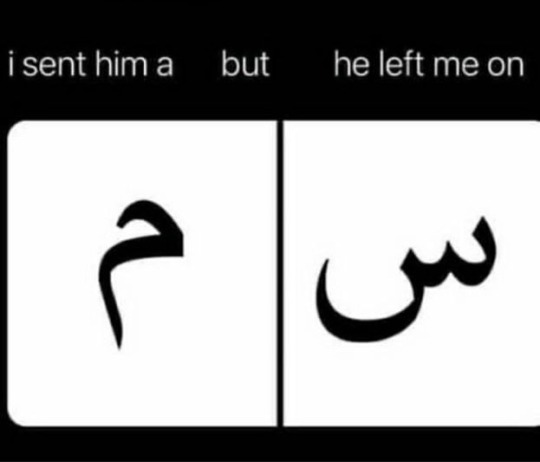
Here’s a meme with Persian alphabet for you:))
The letter م (m) in the Persian alphabet is called ‘میم’ which sounds like ‘meme’, and the letter س (s) is called ‘سین’ which sounds like ‘seen’.
99 notes
·
View notes
Text
Are you the top of the onion or the end of it?
تو سر پیازی یا ته پیاز؟.
(To sar e piaazi yaa tah e piaaz?)
This is a very interesting and widely used expression in Persian.
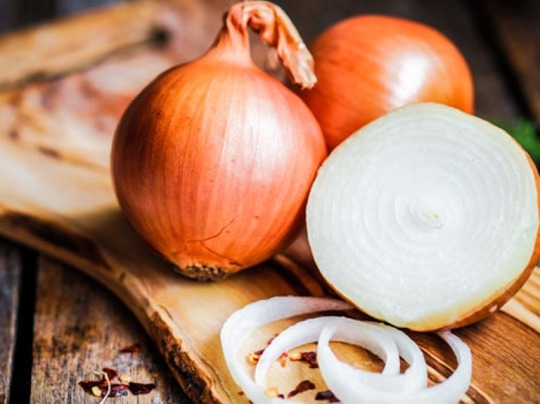
Basically, the top and the end of an onion have some use whereas the middle, which is the stem, is not edible and is thrown away.
When you ask someone if they’re the top or the end of the onion, you’re asking them: is this issue, in anyway, relevant to you? Is this any of your business? If not, then stay out of it!
The situation in which you may use this expression is when some nosy guy is trying to get involved in something that has nothing to do with them. This expression is used to show your displeasure at the guy’s attempt to poke their nose into your business.
There’s another way to use this expression.
I’m neither the top nor the head of the onion.
من نه سر پیازم نه ته پیاز..
(Man na sar e piaaz am na tah e piaaz.)
In this case, you’re saying that the issue has nothing to do with you so others should just leave you out of it instead of blaming you for it or trying to get you involved.
61 notes
·
View notes